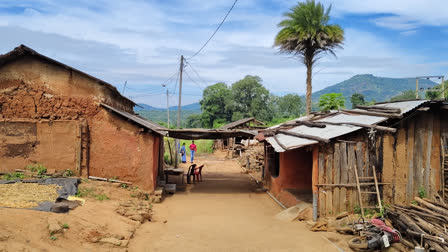Mandipanka village of Odisha, where there is silence, mango kernels become a food for the tribals…
Bhubaneswar: A few days after the death of 3 women after eating mango seeds, there is silence in Mandipanka village and the people here are lost in uncertainty. Meanwhile, ETV Bharat correspondent Seemar Kumar Acharya reached Mandipanka. During this time, as soon as he stepped on the land of Mandipanka, he started feeling nervous.
He told, when I reached the village there was peace there. However, it was disturbing in many ways. No one on the streets was interested in talking to me, nor were they excited about the sudden influx of outsiders (investigation team members and journalists and government officials) roaming in the village. Even after more than 20 days of deaths due to mango seeds, there was silence in Mandipanka and the people here were in uncertainty.
Before sunrise on the morning of 1st November, the news of eight women falling seriously ill in Mandipanka spread like wildfire in Kandhamal district and within a few hours the tragic death of three women after eating mango seed porridge became a horrific incident. It became a truth.
mourning of death in the village
Odisha has been struggling with food insecurity for more than two decades, but Mandipanka had never faced such a huge loss before. Today, it has been more than 20 days since the tragedy, but the village is still mourning in silence and struggling to accept this truth.
The families of the deceased – once united in joy and celebration – are now immersed in grief. “We used to sit together, eat together, laugh together,” says a teary-eyed relative, Tarana Pattamazhi. Now this place looks dystopian.” The same mango seed that supported the community in difficult times has now become a harbinger of death.
The kernels had become poisonous
The mango kernels, carefully stored for three years, were prepared as per the need. For many tribal families, kernels are used as an alternative during the dry season. They were washed, dried and painstakingly ground, often eaten as porridge with rice, to stave off hunger, but that day, the starchy kernels turned poisonous, leading to severe poisoning.
This tragedy has left many questions to which no answer has been found. Such as whether these deaths could have been avoided with better awareness or food safety measures? Or was it a result of persistent food insecurity and reliance on traditional subsistence practices?
Mandipanka no longer echoes with the laughter of its women. The place where they once gathered to cook meals and share stories now seems eerily quiet. A shadow of mourning has spread over every house.
An innocent child wandering aimlessly, too young to understand that his mother will never return. A husband is looking with empty eyes at the place where he last saw his wife, lost in the memories of the good days. The entire village seems to have come to a standstill. It seems that he is torn between grief and fear.
people in mourning
Grieving husband Jodadar Patra says, “My wife took care of everything – our children, the fields, our food. Now we don't know how to move forward.” Beyond individual stories of loss, the tragedy of Mandipanka raises serious questions for tribal communities across Odisha.
The tribals here use rice as their main food. Also, dishes made from mango kernels, such as mango kernel porridge, have long been used as a traditional supplement during food shortages, but is this practice now safe?
Beyond individual stories of loss, the tragedy of Mandipanka raises important questions for tribal communities across Odisha. With rice as their staple food, dishes made from mango kernels such as mango kernel porridge have long been used as a traditional supplement during food shortages. But is this practice safe now
Pravati Pattamajhi, an elderly village resident, says, “It is not easy to change your diet. We are dependent on the forest and the things it provides, but after this incident, how can we trust our food
Immediate assistance to affected families
Government intervention is important now. Immediate assistance has been provided to the affected families, but larger issues of food security and tribal welfare still remain unresolved. Will these communities get the support they need to adopt safe food practices? Or they will have to face the same risks in the future
As the sun sets in Mandipanka, the village remains immersed in sorrow. The death of three women here has left a void that may take years to fill. But the tragedy also serves as a sobering reminder of the challenges faced by Odisha's tribal communities – where survival is not easy.
Chief Minister Mohan Charan Majhi had ordered an RDC level inquiry into this tragedy. Under this, instructions were given to distribute three months' worth of rice in the affected areas as a temporary relief measure.
However, opposition leaders, especially BJD and Congress, criticized the government's delayed response and said neither the chief minister nor any cabinet minister has visited the area to directly assess the situation. As of now, Mandipanka waits for answers, justice and hope that such a tragedy will never happen again
Post Views: 70


Comments are closed.